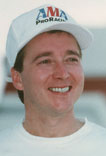 Freddie Spencer, or "Fast Freddie," as fans called him, will go down in history as one of the greatest road racers that America ever produced. Spencer was a record setter. In addition to winning three world championships, he was the only rider ever to win the 250cc and 500cc Grand Prix World Championships in the same season (1985). He was the only rider to win three major races during Bike Week at Daytona International Speedway (the Superbike, Formula One and International Lightweight races in 1985), the youngest rider to win the 500cc Grand Prix World Championship (at 21), the youngest rider ever to win an AMA Superbike race in 1979 (age 18) and had the longest span between AMA Superbike victories (just under 16 years).
Freddie Spencer, or "Fast Freddie," as fans called him, will go down in history as one of the greatest road racers that America ever produced. Spencer was a record setter. In addition to winning three world championships, he was the only rider ever to win the 250cc and 500cc Grand Prix World Championships in the same season (1985). He was the only rider to win three major races during Bike Week at Daytona International Speedway (the Superbike, Formula One and International Lightweight races in 1985), the youngest rider to win the 500cc Grand Prix World Championship (at 21), the youngest rider ever to win an AMA Superbike race in 1979 (age 18) and had the longest span between AMA Superbike victories (just under 16 years).
Spencer was born December 20, 1961, in Shreveport, Louisiana. Young Spencer became a racing prodigy, learning to ride at 4 and entering his first races at age 5. By the time he was 11, Spencer had already won numerous regional dirt track racing championships in Texas and Louisiana. As a teen, Spencer began concentrating on road racing and continued winning by earning national amateur and club road racing championships.
On June 16, 1979, Spencer won his first AMA National, the Lightweight (now called 250 Grand Prix) National at Loudon. He went on to win the 250GP title that season over Eddie Lawson. Spencer also raced Superbikes for the first time that season. He won the Sears Point and Laguna Seca rounds of the series and finished third in the championship. His victory at Sears Point (riding a Kawasaki) made him the youngest rider to ever win an AMA Superbike national at 18 years, 8 months of age.
When Honda officially entered AMA Superbike racing in 1980, it picked Spencer to be one of its riders. Spencer gave Honda its first AMA Superbike victory on June 1, 1980, at Road America in Elkhart Lake, Wisconsin. That same year, Spencer got his first taste of international competition in the U.S. vs. Britain Trans-Atlantic Match Races. Spencer shocked the world when he won two legs of the Match Races, beating world champions Barry Sheene and Kenny Roberts in the process. Spencer went on to finish third in the 1980 Superbike championships and second to Eddie Lawson in 1981 in what was considered the era when Superbike racing came of age. The Spencer/Lawson battles helped take Superbike racing from a second-tier support class to the series that captured the most attention and eventually became the premier road racing class in America.
Spencer split his time between America and Europe in 1981. He raced in the 500cc World Championships, helping Honda develop its NR500 four-stroke GP machine. For 1982, Spencer signed to race in the GPs full time, but before he left for Europe he won the Daytona Bell 100 Superbike race in record-setting fashion, leading all but one lap of the race.
On July 4, 1982 Spencer scored his first world championship victory by winning the Belgium 500cc Grand Prix. Spencer was just 20 years old.
The 1983 Grand Prix season turned into an epic battle between three-time world champ and fellow American, Kenny Roberts, and Spencer. It was Yamaha vs. Honda, veteran vs. youngster, the brash Roberts up against the soft-spoken Spencer. The championship came down to the final race of the season and Spencer won the title by just two points. At 21, Spencer was the youngest rider ever to earn the ultimate motorcycle racing championship. Spencer was named co-winner of the prestigious AMA Pro Athlete of the Year Award in 1983 with motocross racer David Bailey.
Spencer suffered through a sub-par season in 1984 while helping Honda develop a new GP motorcycle. He still managed to win four GPs and finished fourth in the final standings.
Spencer’s 1985 campaign will go down in history as perhaps the single greatest season in the sport. He started the year by winning the first Daytona 200 run under Superbike rules. He also swept the Formula One and International Lightweight (250GP) events. It marked only time a rider won the three major races at Daytona. Spencer then went on to win both the 250cc and 500cc Grand Prix World Championships, becoming the only rider in history to accomplish that amazing feat. Spencer was named AMA’s Pro Athlete of the Year for a second time. Spencer’s accomplishments were noteworthy enough to earn him a special citation from President Ronald Reagan.
Spencer retired from full-time GP racing in 1988, but made a couple of comebacks in the next few years. He went on to win three more U.S. Superbike nationals, including his memorable final AMA national victory on a rain-soaked Laguna Seca Raceway in 1995. There, he led by as much as 23 seconds before backing off to cruise to an easy victory. That final victory was just two months shy of 16 years since Spencer had earned his first AMA Superbike win. That span between first and last Superbike victories is a mark that is likely to never be broken.
Spencer officially retired from racing in 1996.
After his racing career was over, Spencer founded a successful performance riding school. He also served as an expert commentator for televised motorcycle races.